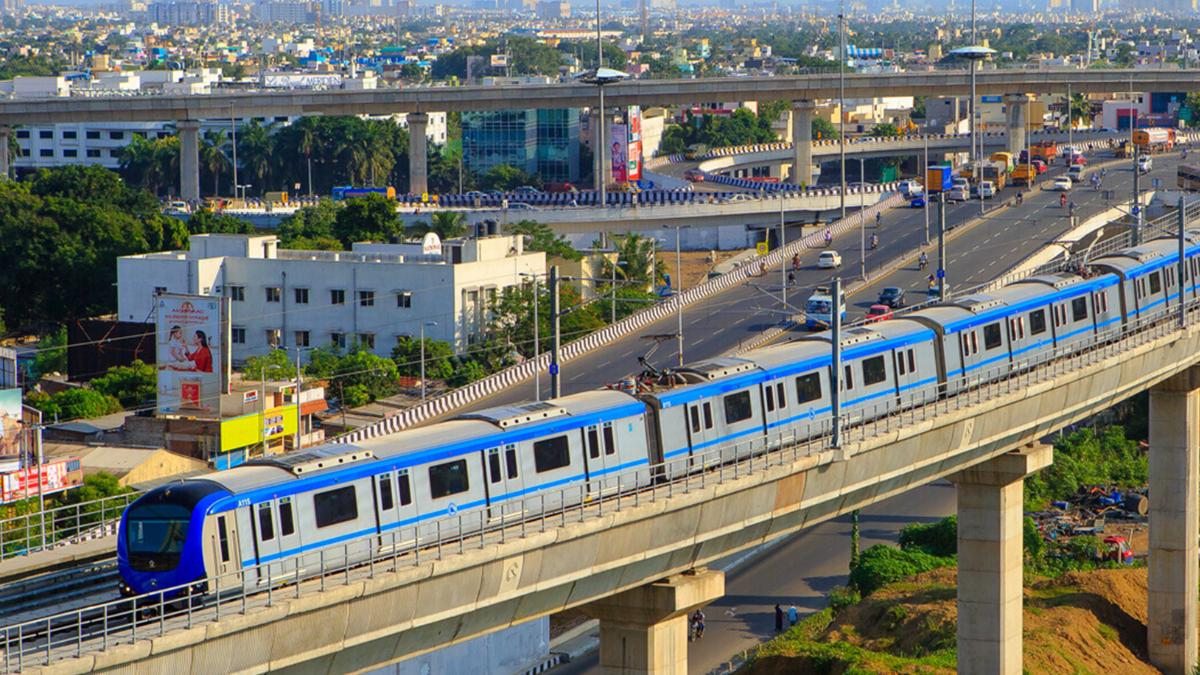Chennai Metro Rail Limited (CMRL) has finalised a long-term partnership with Delhi Metro Rail Corporation (DMRC) for the operation and maintenance (O&M) of three corridors under Chennai Metro’s ambitious Phase II expansion.
The agreement positions DMRC, India’s largest metro rail operator, as the designated O&M agency for Corridors 3, 4 and 5, encompassing a total track length of 118 km and 112 stations, along with depots at Madhavaram, Poonamallee, and Semmancheri. The contract will span approximately 15 years, setting a precedent for inter-agency collaboration in India’s growing metro ecosystem. The formal agreement follows an international competitive bidding process concluded on April 2, 2025, where DMRC emerged as the preferred agency. The awarded work includes the operation of trains, station management, depot functioning, and control centre coordination — all adhering to global metro operations benchmarks.
This marks DMRC’s second major O&M success in a competitive setting, following its contract for Mumbai Metro Line 3 in 2023. Experts suggest this milestone reflects a shift in India’s public transport policy where proven institutional expertise is increasingly being tapped across states to enhance efficiency and service delivery. According to senior officials, the collaboration is rooted in CMRL’s aim to ensure uninterrupted, world-class services for commuters while drawing from DMRC’s established expertise in network integration, asset lifecycle management, and rider engagement.
The three corridors under Phase II are strategically significant for Chennai’s mobility landscape. Corridor 3, the Indigo Line, will run 45.4 km from Madhavaram Milk Colony to Siruseri SIPCOT-II, connecting IT parks and emerging industrial zones. Corridor 4, the Orange Line, will span 26.09 km from Lighthouse to Poonamallee Bypass, bridging the city’s east-west mobility gap. Corridor 5, the Red Line, stretches 44.6 km from Madhavaram Milk Colony to Sholinganallur, linking residential hubs to key job clusters. These corridors are expected to facilitate a multi-modal transit framework by integrating with existing bus services, arterial roads, and the suburban rail system. They are also set to alleviate traffic congestion, curb vehicular emissions, and promote modal shift from private transport, aligning with Chennai’s long-term climate and sustainability goals.
Bringing DMRC onboard introduces a standardised operational framework designed to ensure reliability, punctuality, and energy-efficient practices. Station management will emphasise accessibility, ensuring seamless travel for women, elderly citizens, and persons with disabilities. The agreement also includes maintenance of rolling stock, emergency coordination, fare collection systems, and real-time monitoring from operational control centres. Depot-level maintenance will implement predictive and preventive protocols, reducing disruptions and extending infrastructure life cycles.
With DMRC’s standard operating procedures expected to be fully implemented, Chennai Metro aims to reduce operating costs while enhancing commuter experience. The arrangement is also expected to support the network’s financial sustainability, particularly critical in its early years of service. Officials also highlighted that the partnership will strengthen metro-specific skill development in Tamil Nadu. DMRC will train and deploy a large workforce, while also supporting CMRL in building internal capabilities through staff training and collaborative planning. Experts believe this will help Chennai develop a local talent pool proficient in modern metro operations.
This O&M contract highlights a growing trend in Indian urban infrastructure: cross-state collaboration among metro operators. As new corridors are launched in cities like Pune, Kochi, Lucknow, and Surat, several metro agencies are exploring similar models that combine local oversight with national-level technical expertise. These partnerships enable newer metro systems to bypass early-stage challenges by relying on experienced operators and structured service level agreements. According to transport analysts, this model may evolve into a national framework for metro operations, potentially harmonising service delivery and fare systems across cities.
The agreement also supports broader environmental and social objectives. With reduced emissions per passenger and more equitable access to mobility, the metro is seen as a vital component of Chennai’s net-zero infrastructure ambitions. The corridors will also trigger transit-oriented development (TOD), encouraging compact, pedestrian-friendly neighbourhoods with mixed-use zoning. The first segment of Chennai Metro’s Phase II is expected to be operational by December 2025, with full network commissioning planned in phases through December 2028. In the interim, the focus will remain on seamless integration of systems, reliable service rollout, and public communication to build commuter confidence.
Transport planners note that while the contract strengthens Chennai Metro’s operational future, public expectations will be shaped by last-mile connectivity, safety, affordability, and transparency in grievance redressal. Vigilant performance monitoring and citizen-centric service benchmarks, they say, are essential to ensure that this public-private operational model delivers on its promise. Chennai’s decision to leverage DMRC’s operational muscle reflects a progressive outlook on building urban infrastructure that is inclusive, future-ready, and responsive to the evolving demands of a growing metropolitan population.
Also Read : Bandikui Expressway Trial Begins Connecting Delhi Jaipur in 3 Hours Toll Free


